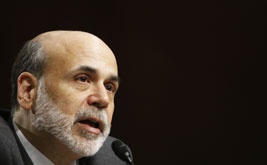Major Student Loan Mistakes, and Ways to Avoid Making Them Major Student Loan Mistakes, and Ways to Avoid Making Them
The economy's long nosedive has done more than raise unemployment rates and housing foreclosures—it's also contributed to a devastating increase in the amount of student debt. Following a recent Education Department report on debt repayment figures, Gawker compiled a list of the top ten universities for student debt, which is topped by NYU's staggering $659 million total. This year also marked the first time in history that outstanding student loan debt exceeded outstanding total credit card debt, with student loan debt nationwide increasing at a rate of about $2853.88 per second. It's a grim landscape for students who've borrowed money, and one that is rife with ways to exacerbate the amount owed. In light of this, Sarah Deveau has provided a helpful list of tips and practices to avoid via the San Francisco Chronicle. Highlights from the pieces, "The 6 Worst Student Loan Mistakes You Can Make" include smart warnings against tempting practices like falsifying information on a student loan application, spending loan money on non-essential purchases and missing payments. "Some experts suggest that your monthly student loan payment should be no more than 10% of your expected salary," Deveau writes. "Calculate your monthly loan payments based on a 10-year repayment schedule, including interest, the find out the average starting salary for your career choice. If your loan payments will be higher than 10%, look at reducing the amount you borrow, either through producing more income or switching to a less expensive program." The bottom line, she says, is this: A student loan is often the first large sum of money a young adult must manage themselves. Avoiding common money mistakes when it comes to financing your college education is crucial to graduating with only good debt, and as little of it as possible. Some of it seems fairly no-brainer, but Deveau lays it out in concrete, practical terms that should make a lot of sense—especially to students taking on loans for the first time.
Sep 10, 2010 / StudentNation / Carrie Battan
This Week at TheNation.com: 1000 Shares. Plus: Two new videos, and a new series starts Monday. This Week at TheNation.com: 1000 Shares. Plus: Two new videos, and a new series starts Monday.
It was back to work this week at The Nation and in D.C., with President Obama and the Democrats in Congress grappling with how critical jobs and the economy are to their chances in November. In my web column for The Washington Post this week, I challenged Wall Street over their recklessness in attacking President Obama's relatively mild efforts at reforming the financial system, after being made whole and profitable again by the bailouts. The reality is that Wall Street's unwillingness to lend or to accept reforms has put the economic recovery at risk. I made a similar argument in this video conversation with Laura Flanders from The Nation on GRIT TV: Class warfare is not, as John McCain would have you believe, overturning Bush's tax cuts for the rich. "Class warfare is when you have corporations sitting on $1.8 trillion." Watch the segment here. Also this week ... Video: The U.S., The U.N and The World The Nation's United Nation's Correspondent Barbara Crossette joined Laura for a conversation about the role of the U.S. in global human rights - specifically our relationship to the U.N. But as President Obama embraces reforms abroad, are we applying the same principles to economic justice at home? Its a thoughtful conversation; watch the video here. Podcast: The Breakdown With Chris Hayes How can the Fed help the economy? Chris Hayes explains the role of the Federal Reserve in the economic recovery, with Neil Irwin of The Washington Post. Listen here, or subscribe in I-tunes. 1000 Shares Contributing Writer Jon Weiner was prepping for a radio interview on KPFK with columnist Katha Pollitt (available here) when he noticed that her recent column, "It's Better Over There," had hit 1,001 "shares" on Facebook. The article is now at 1,045. It's been remarkable to watch the growth of social networking as a tool to spark discussion around Nation content; we always appreciate the shares and re-tweets, and sharing a Nation article is one of the most significant things you can do to help the magazine - and independent journalism. The State of the Race Next Monday we're starting a video series on Election 2010. Our Monday segments from "The Nation on GRIT TV" (posted here each Monday afternoon) will look at one facet of the midterm election, along with a dispatch from one of our reporters out in the field. This week, Melissa Harris-Lacewell and Laura will look at the impact that race is playing on the election: is the GOP race-baiting their way back to a House majority? And we'll hear (via skype) from reporter Dan Bischoff, who is covering the Rand Paul-Jack Conway Kentucky Senate race. Videos are at thenation.com; full episodes are at GRITTV.org. Election Day is Tuesday A reminder that in many states, Tuesday is Primary Election Day. Here in New York, the big race is for Attorney General. I encourage you to get out and vote, and give some thought to my endorsement of Eric Schneiderman before you go. - - - That's all for this week. As always you can keep up by following The Nation on Facebook here, or follow me on Twitter - I'm @KatrinaNation.
Sep 10, 2010 / Blog / Katrina vanden Heuvel

The Breakdown: How Can the Fed Help the Economy? The Breakdown: How Can the Fed Help the Economy?
In a major speech last month, Federal Reserve Chairman Ben Bernanke pledged to buy more longer-term securities if the economy continues to worsen. But will this benefit really tric...
Sep 10, 2010 / Audio / Chris Hayes
Wall Street Needs to Change, Not Obama Wall Street Needs to Change, Not Obama
While no one said that reforming Wall Street would be easy for President Obama, the big-money backlash against his proposals has been surprisingly swift and screechy.
Sep 9, 2010 / Blog / Katrina vanden Heuvel

It’s Not the Party—It’s the Policies It’s Not the Party—It’s the Policies
Inequality has risen under Republicans and Democrats when they’ve embraced neoliberalism.
Sep 9, 2010 / Books & the Arts / Robert Pollin

Good Policy, Good Politics Good Policy, Good Politics
No one should mistake GOP protest for an indication that Obama's commitment to $50 billion in infrastructure spending is sufficient to tackle unemployment. It's a start, but it's n...
Sep 9, 2010 / Editorial / The Editors
Fighting Class War Fighting, Bob-Style Fighting Class War Fighting, Bob-Style
Solid progressive Senators like Russ Feingold, the sole Senate vote against the Patriot Act, are feeling the lash this election cycle because of misplaced anger from the Tea Partye...
Sep 8, 2010 / The Notion / Laura Flanders
It’s the Mortgages, Stupid It’s the Mortgages, Stupid
This week's proposals by the Obama administration to deal with the persistent economic crisis will be, as with previous plans that involved trillions of taxpayer dollars, little...
Sep 8, 2010 / Robert Scheer
Briefing: Katrina vanden Heuvel on Class Warfare from the Top Down Briefing: Katrina vanden Heuvel on Class Warfare from the Top Down
When people like Elizabeth Warren are demonized and deficits are a point of obsession, it's not the rich who have to worry about class warfare, says Katrina vanden Heuvel.
Sep 7, 2010 / Video / The Nation on Grit TV

Nevada Goes Bust Nevada Goes Bust
A severe budget crisis has put all state services--from education to eldercare--in jeopardy.
Sep 2, 2010 / Feature / Sasha Abramsky
